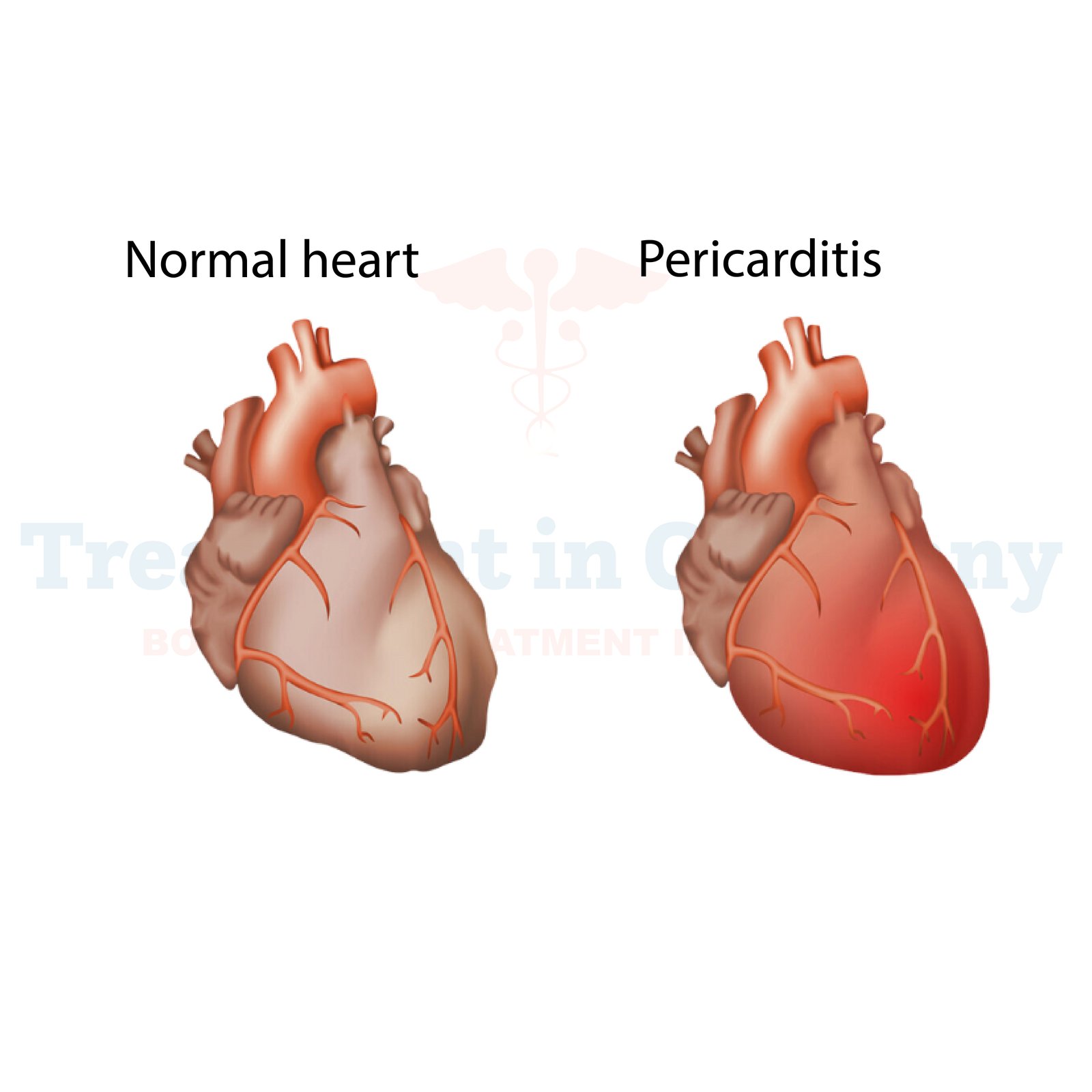Pericarditis Treatment in Germany
Pericarditis is a condition characterized by inflammation of the pericardium, the thin sac-like membrane surrounding the heart. This inflammation can cause chest pain, fluid buildup around the heart, and other complications if not treated promptly. While pericarditis can be acute, subacute, or chronic, understanding its causes, symptoms, and treatment options is essential for managing the condition effectively. Germany is renowned for its advanced diagnostic tools and innovative therapies for treating pericarditis, making it a preferred destination for international patients.
The pericardium consists of two thin layers that protect and hold the heart in place. Between these layers is a small amount of fluid that reduces friction as the heart beats. Pericarditis occurs when this membrane becomes inflamed, often leading to sharp chest pain and other symptoms.
Types of Pericarditis
Pericarditis is classified based on the duration and pattern of the condition:
- Acute Pericarditis: Sudden onset of inflammation that typically lasts less than six weeks.
- Subacute Pericarditis: Symptoms develop more gradually and persist for 6 weeks to 6 months.
- Chronic Pericarditis: Inflammation that lasts longer than six months.
- Constrictive Pericarditis: Thickening and scarring of the pericardium, which restricts heart function.
- Effusive Pericarditis: Excess fluid accumulation in the pericardial sac, leading to cardiac tamponade in severe cases.
Causes of Pericarditis
Several factors can lead to pericarditis, including:
- Viral Infections: The most common cause, often linked to viruses like Coxsackievirus or influenza.
- Bacterial Infections: Including tuberculosis and other bacterial pathogens.
- Autoimmune Disorders: Conditions like lupus or rheumatoid arthritis may trigger inflammation.
- Post-Heart Attack (Dressler Syndrome): Inflammation following myocardial infarction or heart surgery.
- Trauma: Injury to the chest can damage the pericardium.
- Medications and Radiation: Certain drugs or radiation therapy for cancer can induce pericarditis.
- Idiopathic Causes: In many cases, the exact cause remains unknown.
Symptoms of Pericarditis
The symptoms of pericarditis can vary depending on its severity and type. Common signs include:
- Sharp, stabbing chest pain, often worse with deep breathing or lying flat
- Fever and chills
- Fatigue and weakness
- Shortness of breath
- Swelling in the abdomen or legs (in cases of constrictive pericarditis)
- A pericardial rub, a scratchy sound heard through a stethoscope
Risk Factors for Pericarditis
Certain factors can increase the likelihood of developing pericarditis:
- Recent Infections: Viral or bacterial illnesses
- Autoimmune Conditions: Pre-existing autoimmune diseases like lupus
- Trauma or Surgery: Recent chest injury or heart surgery
- Kidney Failure: Chronic kidney disease may predispose individuals
- Cancer Treatments: Radiation or chemotherapy near the chest
- Medications: Certain drugs, including anticoagulants and antibiotics
Diagnosis of Pericarditis
Germany is renowned for its cutting-edge diagnostic capabilities, ensuring accurate detection of pericarditis through advanced tools:
- Electrocardiogram (ECG): Identifies changes in the heart’s electrical activity indicative of pericarditis.
- Echocardiography (ECHO): Uses ultrasound to detect fluid buildup and assess heart function.
- Chest X-Ray: Reveals an enlarged silhouette of the heart due to fluid accumulation.
- Magnetic Resonance Imaging (MRI): Provides detailed images to identify inflammation and scarring.
- Computed Tomography (CT) Scan: Helps visualize the pericardium and detect fluid or thickening.
- Blood Tests: Measure markers of inflammation (C-reactive protein) and infection.
- Pericardiocentesis: Fluid sample removal for laboratory analysis, especially in effusive cases.
Treatment Options for Pericarditis in Germany
Germany offers some of the most advanced and effective treatment options for pericarditis. The treatment plan depends on the underlying cause and severity of the condition:
Medications
- Anti-Inflammatory Drugs: Non-steroidal anti-inflammatory drugs (NSAIDs) like ibuprofen reduce inflammation and alleviate pain.
- Colchicine: Often prescribed to prevent recurrent episodes.
- Corticosteroids: Used in cases of severe inflammation or autoimmune-related pericarditis.
- Antibiotics or Antiviral Medications: Treat bacterial or viral infections.
- Diuretics: Manage fluid buildup in cases of effusive or constrictive pericarditis.
Minimally Invasive Procedures
- Pericardiocentesis: Drains excess fluid from the pericardial sac to relieve pressure on the heart.
- Balloon Pericardiotomy: Creates a drainage pathway to prevent fluid accumulation.
Surgical Interventions
- Pericardiectomy: Removal of part or all of the pericardium in cases of constrictive pericarditis.
- Drainage and Debridement: Removes infected or damaged pericardial tissue.
Advanced Therapies
- Stem Cell Therapy: Promotes heart tissue repair and recovery.
- Dendritic Cell Therapy: Modulates immune responses in autoimmune-related pericarditis.
Solutions to Prevent Pericarditis
While not all cases are preventable, certain strategies can reduce the risk and severity of pericarditis:
- Timely Treatment of Infections: Address infections promptly to prevent complications.
- Healthy Lifestyle: Regular exercise, a balanced diet, and avoiding smoking support heart health.
- Routine Medical Check-Ups: Regular monitoring for high-risk individuals ensures early detection.
- Manage Autoimmune Diseases: Proper treatment of underlying autoimmune conditions can lower the risk.
- Avoid Known Triggers: Minimize exposure to medications or therapies that may induce pericarditis.
Why Seek Pericarditis Treatment in Germany?
Germany is globally recognized for its expertise in treating complex cardiac conditions like pericarditis. Here are key reasons to choose Germany for care:
- World-Class Hospitals: Equipped with cutting-edge technology and facilities.
- Highly Skilled Specialists: Renowned cardiologists and heart surgeons.
- Personalized Treatment Plans: Tailored therapies based on individual patient needs.
- Innovative Therapies: Access to the latest advancements like stem cell and immunotherapy.
- Comprehensive Care: Multidisciplinary teams addressing all aspects of the condition.
- Support for International Patients: Assistance with travel, language interpretation, and accommodation.
Conclusion
Pericarditis is a manageable condition when diagnosed and treated promptly. Germany’s healthcare system offers unparalleled expertise, advanced diagnostic tools, and innovative treatments to ensure the best possible outcomes for patients. By addressing the root causes and providing comprehensive care, patients can achieve long-term recovery and improved quality of life.
👉 Contact us for further information and receive a complimentary consultation.


.webp)
 (1).webp)

.webp)
 (1).webp)


.webp)
 (1).webp)

.webp)
 (1).webp)
